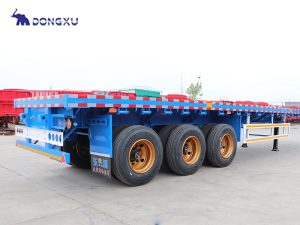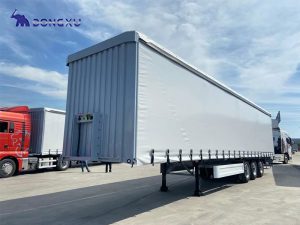How to choose a suitable semi-trailer ?
Choosing a suitable semi-trailer involves several considerations to ensure it meets your needs efficiently and cost-effectively. Here’s a guide to help you make an informed decision:
1. Define Your Needs
- Cargo Type: Determine what you will be hauling. Different trailers are designed for different types of cargo (e.g., flatbeds for machinery, refrigerated trailers for perishable goods).
- Load Capacity: Calculate the weight and volume of the cargo you plan to transport. Ensure the trailer’s capacity matches or exceeds these requirements.
- Distance and Terrain: Consider the typical routes you’ll be driving on (highways, rural roads, etc.) and whether the terrain might impact the type of trailer you need.
2. Trailer Types
- Flatbed Trailers: Ideal for transporting large or heavy loads that don’t require protection from the elements.
- Dry Van Trailers: Enclosed and protected from weather, suitable for general cargo that needs to be shielded.
- Reefer Trailers: Refrigerated trailers for transporting temperature-sensitive goods.
- Tanker Trailers: Designed for liquid cargo, with variations for hazardous materials.
- Drop Deck Trailers: Lower deck for loading taller equipment or cargo.
3. Size and Dimensions
- Length: Common lengths range from 48 to 53 feet. Ensure it complies with local regulations and fits your cargo.
- Height: Standard height is about 13.6 feet. Check if you need a high-cube trailer for taller loads.
- Width: Most trailers are 8.5 feet wide, but some may vary. Ensure it fits within road regulations and your cargo dimensions.
4. Material and Construction
- Material: Aluminum trailers are lighter and resistant to corrosion but can be more expensive. Steel trailers are durable but heavier and may require more maintenance.
- Construction Quality: Check the build quality and brand reputation for durability and reliability.
5. Axle Configuration
- Single vs. Tandem Axles: Tandem axles offer better weight distribution and stability. Consider the axle configuration based on load requirements and maneuverability needs.
- Suspension System: Options include air ride or spring suspension. Air ride provides a smoother ride for sensitive cargo.
6. Regulations and Compliance
- Local Laws: Ensure the trailer complies with weight limits, size restrictions, and other regulations in the areas where you will be operating.
- DOT Requirements: Check for any specific Department of Transportation requirements for safety equipment and maintenance.
7. Cost and Budget
- Initial Cost: Compare prices from different manufacturers and dealers. Consider the cost of optional features and customizations.
- Maintenance and Operating Costs: Factor in long-term costs like maintenance, repairs, and fuel efficiency.
8. Features and Customizations
- Brakes and Safety Equipment: Look for advanced braking systems and safety features like anti-lock brakes, ELDs, and reflective tape.
- Cargo Securing Options: Check for tie-down points, lashing rings, or integrated cargo control systems.
- Weather Protection: Consider features like tarps or covers if you’re transporting goods that need protection from the elements.
9. Resale Value
- Brand and Model: Some brands and models hold their value better over time. Research resale values and market demand.
10. Dealer and Support
- Reputation: Choose a reputable dealer who offers good after-sales support and service.
- Warranty: Check the warranty terms for coverage on parts and workmanship.
By evaluating these factors, you can select a semi-trailer that fits your specific needs and enhances your efficiency on the road.
 Dong Xu Trailer, Semi Trailer
Dong Xu Trailer, Semi Trailer



